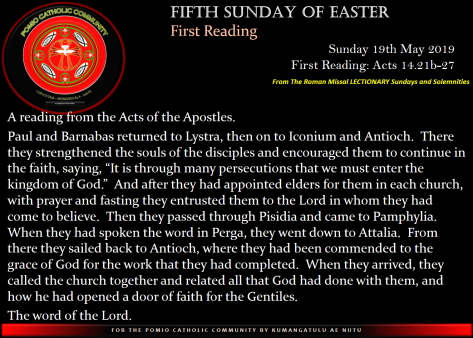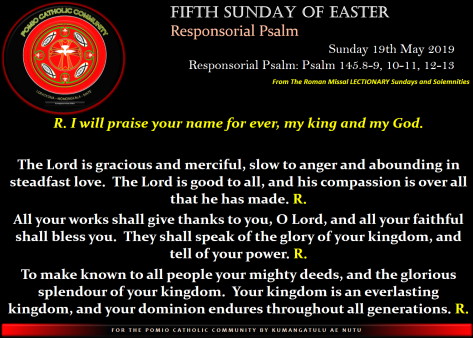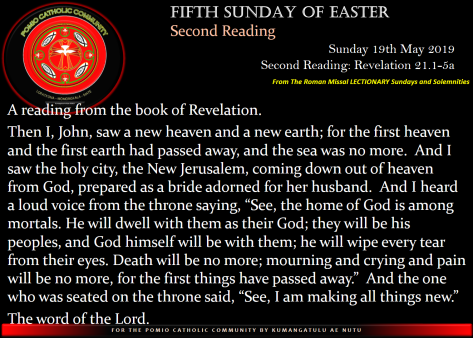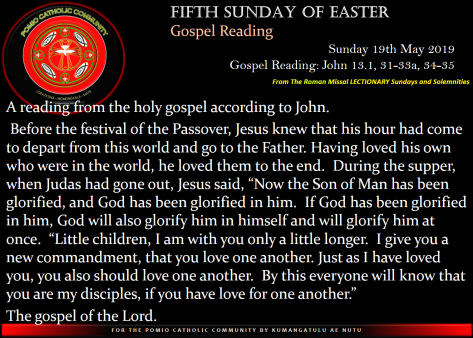
The first reading is taken from Acts 14:21-27. Last week we heard of St. Paul’s experiences at Antioch in Piscidia during his first missionary journey. Their visit had ended on a sour note as Paul and Barnabas were expelled. The reading ended with “the two shook the dust from their feet in protest and went on to Iconium. Their disciples knew only how to be filled with joy and the Holy Spirit”. Today we hear of the conclusion of this first missionary journey where Paul and Barnabas retrace their steps back through Antioch in Piscidia on their way back to Antioch in Syria where they had begun their journey.


The second reading is from the Book of Revelation 21:1-5a. For the past three weeks we have had as our second reading an account of John’s privileged vision of the heavenly liturgy where he has seen the eternal sacrifice being offered to God the Father by His Son, The New and Eternal High priest and sacrifice. We have heard also the prayers being offered by the faithful. We now go to the end of John’s account as he describes the Heavenly Jerusalem. It was Jesus’ mission to go to the earthly Jerusalem to offer His sacrifice — this shows us the path that we must follow to reach the Heavenly Jerusalem so that we can dwell with Him there forever.

The Gospel is from John 13:31-33a, 34-35.We are disciples, followers of Christ, but how many of us would pass the test that Christ himself lays down for deciding who are his true followers? The word “charity” unfortunately has come to have a very restricted meaning in our present-day vocabulary. It signifies giving an alms, a gift of money to a needy person. This is but a very small part of the true charity, true love of neighbor which Christ made the distinguishing mark of the true Christian. He who truly loves his neighbor must be interested, first and foremost, in those things which concern that neighbor’s most important purpose in life, his eternal salvation.
Here is where so many good Christians fail in true charity. Effective interest in missionary activity is a case in point. Practical help in parochial matters, taking part in the various societies which are intended to build up and strengthen the faith and the devotion of the members of the parish is another obligation of true charity. So many seem to think it is no concern of theirs but it is. Advising and encouraging, with true Christian kindness, a neighbor who is beginning to grow lax in his attendance to his Christian duties, or who is forming habits or alliances which, if unchecked, will bring misery and suffering to his family, and scandal to the neighborhood, and even the possibility of his own eternal destruction, is also an exercise of real Christian charity.
There are thousands of broken homes today which would not be broken if there was true charity in those homes not only in the heart of the offender but in the hearts of the offended. There are thousands in jails and in hospitals of rehabilitation today who would not be there if their families and neighbors fulfilled their obligation of Christian charity. There are many, far too many, lapsed Catholics in the world today, who would not have lapsed had true charity been practised by their relatives and neighbors. And, last but not least, there are millions of people who have remained outside the Church of Christ because the hall-mark of charity which Christ said was its distinguishing mark was tarnished or invisible. Each one of us could, with great profit, spend a few moments today looking into ourselves and comparing our thoughts and our words and our actions with the thoughts, words and actions of love which Christ expects from his followers.
It is never too late to mend. Begin today to take a true Christian interest in the spiritual fate of your family and neighbors. Where words have already failed perhaps, try prayer and example. The grace of God will cooperate with your sincere, charitable effort.
Excepted from The Sunday Readings, Fr. Kevin O’Sullivan, O.F.M.
You must be logged in to post a comment.